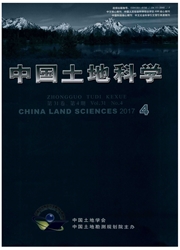

 中文摘要:
中文摘要:
研究目的:揭示农户利益损失的内在行为机理,为农地整治项目利益损失补偿机制的构建奠定理论基础。研究方法:运用禀赋效应理论提出农户利益损失内在行为机理的理论假说,并以湖北省部分县市340份农户问卷为样本,采用定序回归模型,分析农户对耕地被占用禀赋效应的影响因素。研究结果:农地整治过程中农户存在经济损失和主观损失,青苗压占、林木损毁、田块分割只存在经济损失,为补偿价值与市场价值的差值;房屋拆迁、坟墓迁移和耕地占用经济损失和主观损失并存,主观损失源于禀赋效应引起的农户主观价值和市场价值的认知差异。研究结论:不具有禀赋效应的物品发生损失时,应根据物品的市场价格进行补偿;具有禀赋效应的物品发生损失时,应根据禀赋效应的强弱对不同性质财产实行差别化的补偿策略,同时,也应避免过高的禀赋效应对要素的正常流动带来负面的影响,才能保护农户的利益,促进项目的顺利实施。
 英文摘要:
英文摘要:
The paper uses endowment effect theory to put forward the research hypothesis of farmers’ interest loss, which can provide basis for creating the farmers’ interest loss mechanism in the process of rural land consolidation. Obtaining the data of 340 farmers from Hubei by questionnaire survey, the paper uses endowment effect theory to put forward the research hypothesis of farmers’ interest loss, and uses ordered logistic regression model to analyze the factors which influence endowment effect of farmers whose cultivated land have been occupied. The results show that farmers have economic loss and subjective loss in the process of rural land consolidation. Crop loss, tree loss, land segmentation are economic loss, which results from the compensation standard lower than market value; house demolition, grave migration, land loss both are economic loss and subjective loss. And the endowment effect is caused by the difference between farmers’ subjective value and the market value. Therefore, compensating the interest loss of farmers should consider farmers’ endowment effect as well as give special protect to farmers’ property of different nature based on the power degree of endowment effect. At the same time, it also should take various measures to avoid the negative impact on high endowment effect. Only by those ways, we can protect the legitimate rights and interests of farmers and promote the smooth implementation of rural land consolidation project.
 同期刊论文项目
同期刊论文项目
 同项目期刊论文
同项目期刊论文
 期刊信息
期刊信息
